From the September 1, 1994 Chicago Reader.
One of Frederick Wiseman’s strongest documentaries, this nearly three-hour look at a New York welfare center (1975), which concentrates on the interactions between clients and social workers, is both pungent and unbearable in its depictions of frustration and anger on both sides of the counter. Wiseman’s customary refusal to add an offscreen commentary makes the film even more compelling, though it may irritate viewers who feel they need to know more about the cases to decide how they feel about them. Throwing us into the thick of things without a map, Wiseman dares us to reach conclusions according to the evidence of our eyes and ears. It’s impossible to emerge from such an experience unscathed. 167 min. (JR) Read more
From the Chicago Reader (September 1, 1998). — J.R.

The fascinating thing about this award-winning feature-length documentary (1996) by Duan Jinchuan from mainland China is that it often seems to approximate the work of Frederick Wiseman in showing us the everyday workings of contemporary society — although the society in this case is one we generally know little about. The focus here is on a neighborhood committee in Lhasa, Tibet, where citizens go to settle family disputes, petty thieves and other delinquents are chastised and advised, community finances are computed, and street vendors are regulated, among many other activities. This doesn’t register like a thesis-driven film, though the preparations for an official ceremony celebrating the Chinese occupation of Tibet towards the end certainly has its creepy side, and one that implicitly rhymes with the other forms of patriarchal rule that one has witnessed in most of the preceding segments. (JR) Read more

